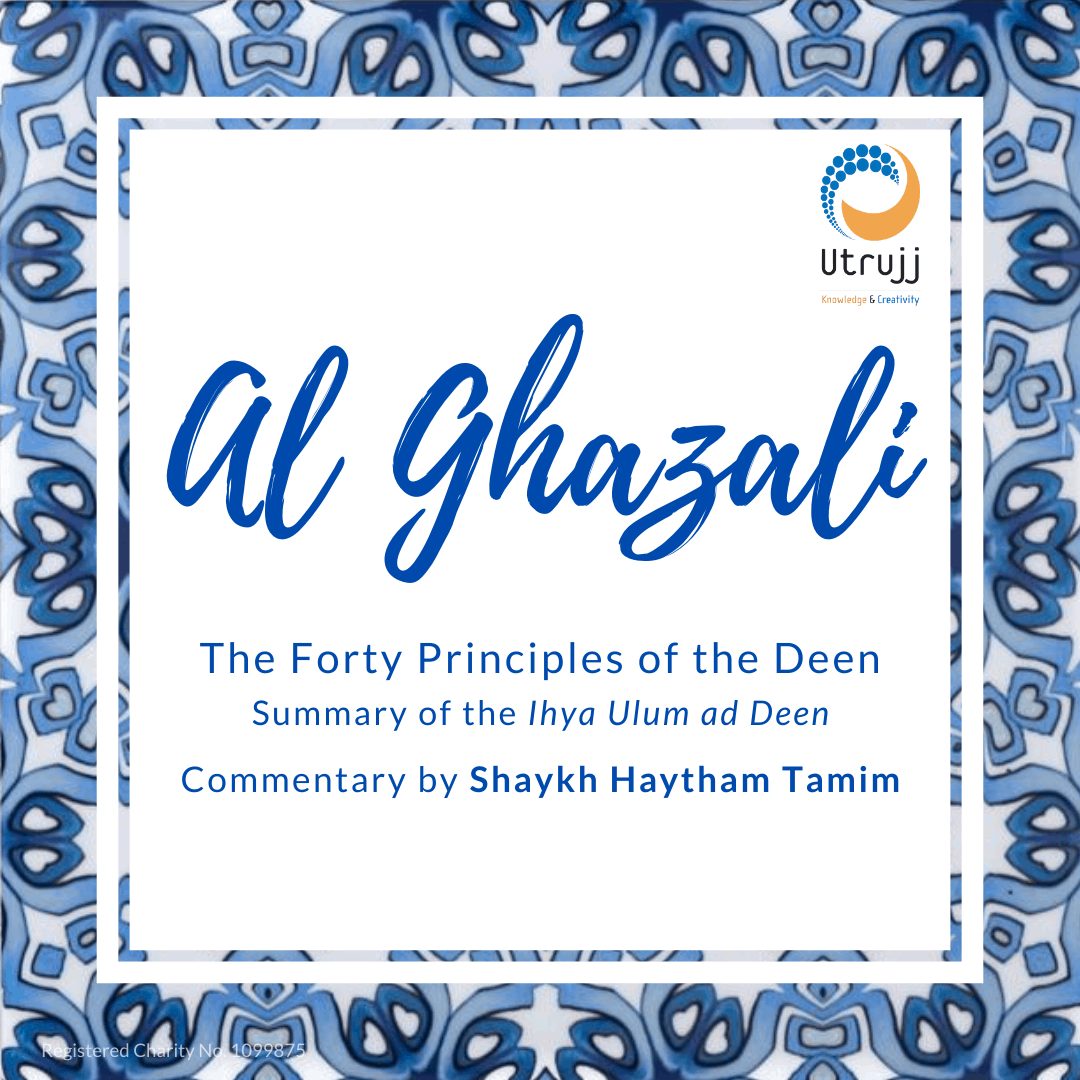Ghazali on how to organise your wird

In Imam Ghazali’s Kitaab Al-Arba’in Fi Usul ad-Din, The Forty Principles of the Religion, which is a summary of his great work, Ihya Ulum ad-Din, he talks about how to organise your daily wird.
Wird
Wird means your daily remembrance of Allah. Wird is the singular of awrad. It may be your daily recitation of 3 pages of Quran, or your daily morning and evening dhikr.
How to organise your awrad
Ghazali says that there are acts of worship which can be done simultaneously such as praying and fasting and reciting the Quran. Then there are acts of worship which cannot be combined, such as the recitation of the Quran and dhikr (such as the tasbih), or serving people and praying. You cannot do both at the same time. Therefore you need to organise your daily worship.
This is a priority so you need to divide them and fill your time with them.
The purpose of worship
We all have to-do lists, but Ghazali’s list is related to remembering Allah. He says that the purpose of our ibadah (worship) is to detach us from the dunya and make us closer to Allah and the akhirah.
No one rises to the eternal abode except he who comes to Allah loving Him. No one loves Him except he who knows Him and remembers Him frequently.
Neither knowledge, nor love occurs except by constant thinking and remembrance and remembrance does not remain constant in the heart except by reminders (such as salah five times a day).
Blissful life in the akhirah is achieved by having love for Allah Almighty but you cannot have this love unless you know Allah. Knowledge and love of Allah do not come without thinking about Him and learning about Him and having continuous dhikr of Him.
This dhikr cannot last in the heart without reminders, which Allah made obligatory on us. These occupy our time to the extent that there is no time we neglect Allah – we have Fajr, then Duha, Dhur, Asr, Maghrib, Isha and tahjud and then Fajr again, so there is no time when we are not turning to Him in worship.
Variety
Our salah comes in different configurations, such as 3 Fard in Maghrib and 2 Fard in Fajr. These keep us engaged and their variety keep us from being bored, as we are creatures who like variety. Similarly we have siyam, the special time at Sahar before Fajr. Allah Almighty created us and knows our nature, so He has given us different obligations in our routine to prevent us worshipping Him in autopilot mode.
Why we need to organise our worship
If you love Allah dearly and you see none but him this is a very special level you will need not any reminders to worship Him as you are already 100% occupied with dhikr and worship. However the reality is that we are not at that level. And Ghazali humbly puts himself in the same camp as the lay person, and says that as we are not at that high level, we need to organise our awrad.
Wird
From the time you wake up for Fajr til the sun rises, he recommends the following forms of worship:
- Dhikr
- Dua
- Recitation
- Reflections
Do these in this sequence, as each has a special sweetness and brings light to the heart.
Ghazali goes into more details in his Bidayat al Hidaya and Ihya Ulum ad Din. The summary of this is that if your level is that of a lay person or business man or teacher it is important to seek knowledge and halal rizq.
4 things you should do
• Salah
Salah is full of goodness. Increase it as much as you want or if you want do only the required obligations depending on your ability and state. 10-15 mins after the sun rises you can pray duha. In Indian subcontinent they call it the Ishraaq. Pray 2, 4,6, or 8 rakahs in sets of 2.
• Gain obligatory knowledge
Do not waste your time in inconsequential things. Some students can barely distinguish between the Sunnah and Fard but want to know Usul al Fiqh Maqasid of the Shariah. First make sure you know the obligations, such as the pillars of the salah, the wajibaat and then move on to extra knowledge.
Seeking Fard al Ayn (obligatory knowledge) increases your closeness to him, shows you your gaps and helps you know your ibabdah. It connects you to the akhirah and not the dunya.
Imam Ghazali collected all the required knowledge in his Ihya which has been summarised by many scholars down to around 300 pages.
• Occupy your time in goodness
Instead of wasting time on social media and Netflix, you can occupy your time on what is beneficial by being a dedicated knowledge seeker, attend circles and know your deen. When you occupy your time in ibadah, recitation, salah, and tasbih this will make you among the winners inshallah. Do something useful for the community. Do good deeds, provide a service, help the needy, teach a skill or knowledge to others depending on what you have to offer, attend the janazas. These are better than performing extra nawafil salah.
However, it is important to remember that relaxing and halal entertainment is allowed and required. We cannot just pray, fast and seek knowledge as we are human not angels.
• Seek the halal and do not cheat
If you do not have time to do that, as you have to look after your sick mother or earn to feed family, seek the halal and avoid cheating and doubtful matters. Have the right intention because seeking the halal is a rewarding act.
Therefore even if you are at work, you can still have dhikr of Allah in your heart and on your tongue. You will still get the reward of seeking the halal, but you can top it up with adhkar.
I remember there was a car bodywork mechanic in his 60s who used to attend our circle in the mosque. He loved the Quran and he had beautiful voice but he did not know how to read and write. Our Shaykh Wasif al Khateeb took it upon himself to teach him how to read and write and he learned the alphabet and then progressed to writing out the ayahs he was learning. The man would open the mushaf in his breaks while fixing cars. When you are sincere and you have the will, Allah opens the way for you. He was so good he could recite any page of the Quran like Abdul Basit.
Three levels of people
There are three types of people
- Salim – those who are safe. These are the ones who only do the obligations and refrain from prohibitions. They do the bare minimum. We can be in this level.
- Rabih – the winners. These are the ones who do their obligation and then do extra adkhar and voluntary actions. Asabiqun as sabiqun.
- Khasir – the losers. Do not be in this level!
After the sunrises, you occupy yourself with adhkar of the tongue and then the second thing is to reflect which is the action of the heart and the mind. Then after asr, occupy your eyes and hands with reading and teaching and writing. This was the common thing at that time, so it does not have to be like that. He said avoid writing at night as they did not have light. Keep the night for prayers and reading.
Actions of the tongue are to recite the daily adkhar and recite a portion of Quran every day.
Actions of the heart and mind are to reflect on Allah and His creation.
Actions of the hand are writing.
You also need to rest. During the winter you can sleep long hours and wake up before Fajr for Tahajjud. In the summer, the nights are short and you can sleep during the day.
In this way, you can keep yourself occupied with the remembrance of Allah in all scenarios.
Shaykh Haytham Tamim – The Thursday Al Ghazali Class
Related posts
Why is following the sunnah the key to success. Ghazali’s secrets part 1
What is wrong with excessive laughter?
Do you have to practice what you preach?
Self righteousness when giving counsel
Brotherhood, friendship and wilayah
How to deal with difficult neighbours
The first 6 rules of how to deal with people
How to deal with people according to their status (9-11)
Cover the faults of others (12-13)
Defend others in their absence, be tactful, be cautious of the company of the rich (16-18)
- Cover the faults of others. Ghazali’s Rules 12-13 for dealing with people.
- How to deal with people according to their status. Ghazali rule 9-11
- Dealing with gossip and arguments. How to deal with people: Ghazali’s rules 7-8
- What do we learn from the Euros 2020? Lessons on success
- Should you only drink while sitting down?


Recommended Posts

How Allah strengthens the hearts of believers
April 19, 2024

Don’t be a Ramadani person – Be a Rabbani person.
April 10, 2024

